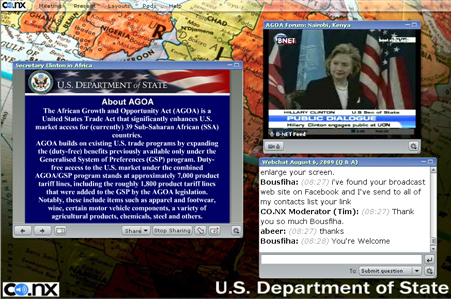State deploys low tech social media to reach those without computers
Stripped-down process for town hall meetings includes displaying presentations in text-only formats, printing transcripts and soliciting questions via text messaging.
 Web conferencing software is revolutionizing the way the State Department communicates with people across the globe.
Web conferencing software is revolutionizing the way the State Department communicates with people across the globe.
The State Department is modifying some social networking techniques and expanding cell-phone communications to engage quickly citizens overseas who do not have computers.
Since October, overseas posts have relied on the social networking site Facebook to advertise online question and answer town hall meetings that are open to Internet users worldwide. To attract foreigners without high-speed Internet access, the department displays the presentations in text-only formats and State Department staff at Internet-equipped embassy posts accept handwritten questions from the public.
In Madagascar, department personnel plaster the community with fliers and posters that ask residents to jot down comments on the notices. After the Webcasts, locals are shown printed transcripts of the events. "It's a real low-tech way to gather the questions," said Mark Betka, a program officer at State who often moderates the events.
Sending a speaker overseas to meet with one foreigner could cost $10,000, but department officials in Washington can interact with thousands of people simultaneously at posts worldwide for $160,000 annually through social networking services, officials said. The latter cost includes software, servers and support.
Recent global online events include a digital videoconference about American volunteerism that was aimed at inspiring Indian youth to support a national cause. On Aug. 5, State held an online session in Portuguese about corruption in Africa to coincide with Secretary of State Hillary Clinton's trip there. State has convened hundreds of online programs during the past eight months with embassy posts including Iraq, Afghanistan, Tanzania and Mexico.
Using Adobe Web conferencing software and social networking invitations, the department has achieved a low-cost approach to two-way communication with the worldwide public, officials said. "The technology is less important than how one is revolutionizing one's way of communicating," said Duncan MacInnes, principal deputy coordinator at State's Bureau of International Information Programs. "You can reach millions if you put something on television, but it's a one way street."
State purchased additional server space in June that will allow more U.S. embassies and consulates to run their own programs independent of Washington, officials added. The servers are located in London so that signals do not have to travel all the way from Washington.
State has encouraged populations that have more cell phones than computers to send text messages during Webcasts, such as during President Obama's July 11 speech in Ghana .
All events advertised on Facebook also are promoted on America.gov , a State Web site intended to foster international sympathy for U.S. interests by disseminating information on foreign policy and social issues.
Officials acknowledged that staffers began marketing the events on Facebook before the government officially sanctioned use of the tool this spring. "Many of our posts overseas started before permission was given. People just started using it all over," Duncan said.
But a governmentwide terms of service agreement that the General Services Administration brokered with Facebook has been very useful for protecting privacy, he said.
NEXT STORY: Marines and Social Nets: We Goofed






